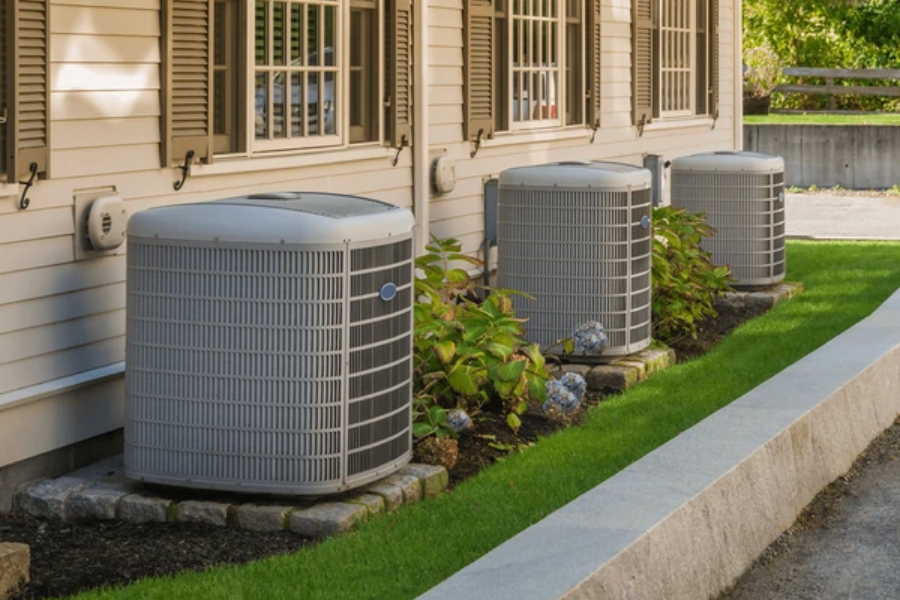Boost Efficiency: Assess Your Heat Pump’s Condition
Regularly assessing your heat pump’s condition is essential for maintaining energy efficiency and performance. Inspections help identify issues like clogged filters, refrigerant leaks, or worn-out components, ensuring the system operates smoothly. Routine maintenance extends the unit’s lifespan, reduces energy consumption, and prevents costly repairs, helping you maintain comfort while controlling energy costs.
Introduction to Heat Pump Maintenance
Heat pumps are necessary to maintain a comfortable indoor temperature throughout the year, allowing you to enjoy warm summers and mild winters. However, like all mechanical systems, they have a finite lifespan and will inevitably need replacement. You can prevent discomfort and avoid unexpected expenses by recognizing signs that your heat pump is failing. If you’re experiencing trouble with your heat pump Massachusetts, assessing its condition might be wise. Here are seven signs that it may be time to consider a replacement.
Inconsistent Temperatures
One of the most telling signs of a failing heat pump is inconsistent temperatures throughout your home. If you notice that certain rooms are sweltering while others remain uncomfortably cold, it may indicate that your heat pump is having difficulty distributing air evenly. Wear and tear over time can significantly impact the system’s efficiency, leading to fluctuating temperatures. Consistent and even temperature distribution is essential for comfort and energy efficiency, as an overworked system will consume more power to try to balance the temperatures. This inconsistency can lead to higher energy bills and strain your heat pump’s performance, causing a domino effect that leads to premature wear and more frequent breakdowns.
Unusual Noises
Since heat pumps are meant to run silently, any strange noises should be taken seriously immediately. If you start hearing grinding, squealing, or rattling, it may signal that parts within the system are wearing out or that there is a more significant mechanical issue. These noises could stem from problems, including loose components, motor issues, or trapped debris. Ignoring these acoustic warnings can lead to more severe damage, necessitating costly repairs or a complete system replacement sooner than anticipated. Checking and addressing these sounds promptly can prevent minor issues from escalating into major repairs.
Rising Energy Bills
An increase in your energy expenses that does not correspond with a rise in use is cause for concern. As heat pumps age, they lose efficiency, which causes them to work harder and consume more energy to maintain the desired temperature. As the U.S. Department of Energy states, older systems typically use more power to provide the same comfort level, leading to higher utility costs. Monitoring your energy bills can provide early insights into the declining efficiency of your heat pump, helping you decide when it might be more economical to invest in a replacement. Analyzing monthly energy consumption can highlight changes in efficiency and help you calculate the potential savings from purchasing a new, more efficient model.
Frequent Repairs
An increasing number of calls to your technician may indicate that your heat pump is near the end of its usable life. Continual repairs drain your wallet and signal that the system fails to function. Each component breaking down is a sign that the system as a whole could soon become irreparable. Eventually, the cost of ongoing repairs will outweigh the expense of a new installation. A new heat pump may save you money over time and guarantee continuous comfort in your house, even if the initial cost may seem high. Assessing the cumulative cost of repairs versus replacement can guide a more informed decision.
Poor Air Quality
An older heat pump can significantly degrade air quality in your home. If you observe an increase in dust, allergens, or uncomfortable humidity levels, it may indicate that your heat pump is not effectively filtering the air anymore. High air quality is essential for your health and well-being; a failing heat pump can exacerbate respiratory issues and allergies. Proper air filtration and humidity control make your home more comfortable and healthier. Regular maintenance and timely heat pump replacement can help maintain a healthier indoor environment, enhancing overall quality of life. The effects of poor air quality on energy levels, sleep, and general health make it imperative to address it right now.
Visible Wear and Tear
Inspecting your heat pump periodically for visible signs of wear and tear can provide critical insights into its condition. Look out for rust, cracked ducts, or other damaged components, as these are clear indicators that the system is deteriorating. While regular maintenance can mitigate some wear and tear, eventually, parts will degrade beyond repair. Visual inspections can serve as an early warning system, helping you decide when to replace your heat pump before it fails. Frequent visual inspections can also help you save time and money by identifying minor problems before they become expensive fixes.
Your Heat Pump Is Over 10-15 Years Old
The typical lifespan of a heat pump ranges from 10 to 15 years. If your system is within this age bracket or older, it’s time to evaluate its performance critically. Older heat pumps are usually less energy-efficient and lack the advanced features of modern models. According to a Consumer Reports guide, switching to a modern, energy-efficient heat pump may save energy costs dramatically and increase the comfort of your house. Upgrading your system can also provide peace of mind, knowing that your new heat pump is less likely to break down when needed. Reviewing the benefits of newer models can help justify the upfront investment by showing clear, long-term savings.
Conclusion
The efficiency and comfort of your house must know when to update your heat pump. Regular maintenance extends the unit’s lifespan, but replacement is the most sensible option. Recognizing these signs helps make informed decisions. Professional advice and regular check-ups are recommended for optimal HVAC system operation. A proactive approach helps avoid issues and maintains a comfortable living environment. Upgrading your heat pump is an investment in your home and overall quality of life.




